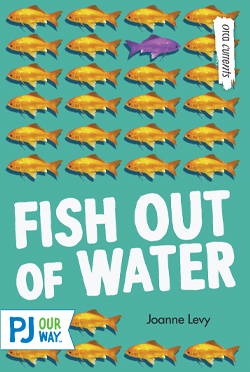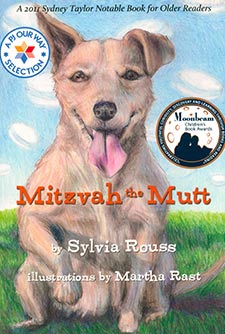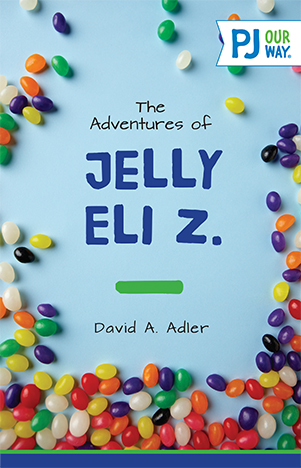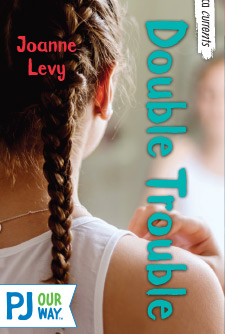Fish Out of Water
Like most of his friends, Fishel “Fish” Rosner loves ice cream. Unlike most of his friends, he also loves knitting and Zumba. Why is that such a problem?
Average Rating
( hint: Login to leave a review! )
65 Reviews
Leave Review
What the Book Is About
Jewish Content & Values
Positive Role Models
Content Advisory
Talk It Over
More for You
What the Book Is About
Twelve-year-old Fishel “Fish” Rosner hates sports. When his mother signs him up for water polo at the JCC, he goes to the senior Zumba class instead. When his best friend Seth invites him to collect used hockey equipment to donate for his bar mitzvah project, Fish dreams of knitting to help others. His family and friends don’t really understand him, but eventually it all works out for the best in this heartwarming, short and sweet Hi-Lo (higher interest material, lower reading level) selection.
Jewish Content & Values
- Fish takes Zumba class with the seniors at the local Jewish Community Center.
- Fish meets with a rabbi and prepares for his bar bitzvah by preparing a Torah reading, a speech, and doing a mitzvah project. His friend Seth collects used hockey equipment to donate, and Fish volunteers at a local Jewish old age home called Shalom Village.
Positive Role Models
- Fish remains committed to his passion, knitting, despite social and familial pressure.
- After initially pushing Fish towards more traditional “masculine” activities, Fish’s mother and bubbe come around and fully support his goals and dreams.
Content Advisory
None.
Talk It Over
Richard, the Zumba teacher, tells Fish that the seniors really enjoyed having him join the class because his energy and enthusiasm were infectious. Have you ever done an activity when the people around you were enthusiastic? What about bored? How did that affect your experience?
More for You
Jewish Community Centers, or JCCs, provide the largest platform for Jewish engagement in North America. They promote Jewish culture, heritage, and education and are open to people of all backgrounds. The movement began in Maryland in 1854 as the Hebrew Young Men’s Literary Association; a branch opened in New York City about 20 years later. Today, there are over 350 sites in the US and Canada, 180 in the former Soviet Union, 70 in Latin America, 50 in Europe, and close to 500 smaller centers in Israel.
What the Book Is About
What the Book Is About
Twelve-year-old Fishel “Fish” Rosner hates sports. When his mother signs him up for water polo at the JCC, he goes to the senior Zumba class instead. When his best friend Seth invites him to collect used hockey equipment to donate for his bar mitzvah project, Fish dreams of knitting to help others. His family and friends don’t really understand him, but eventually it all works out for the best in this heartwarming, short and sweet Hi-Lo (higher interest material, lower reading level) selection.
Jewish Content & Values
Jewish Content & Values
- Fish takes Zumba class with the seniors at the local Jewish Community Center.
- Fish meets with a rabbi and prepares for his bar bitzvah by preparing a Torah reading, a speech, and doing a mitzvah project. His friend Seth collects used hockey equipment to donate, and Fish volunteers at a local Jewish old age home called Shalom Village.
Positive Role Models
Positive Role Models
- Fish remains committed to his passion, knitting, despite social and familial pressure.
- After initially pushing Fish towards more traditional “masculine” activities, Fish’s mother and bubbe come around and fully support his goals and dreams.
Content Advisory
Content Advisory
None.
Talk It Over
Talk It Over
Richard, the Zumba teacher, tells Fish that the seniors really enjoyed having him join the class because his energy and enthusiasm were infectious. Have you ever done an activity when the people around you were enthusiastic? What about bored? How did that affect your experience?
More for You
More for You
Jewish Community Centers, or JCCs, provide the largest platform for Jewish engagement in North America. They promote Jewish culture, heritage, and education and are open to people of all backgrounds. The movement began in Maryland in 1854 as the Hebrew Young Men’s Literary Association; a branch opened in New York City about 20 years later. Today, there are over 350 sites in the US and Canada, 180 in the former Soviet Union, 70 in Latin America, 50 in Europe, and close to 500 smaller centers in Israel.




